Tahini is a spread made from crushed and ground sesame seeds. It’s an ancient food, having been used for thousands of years in the Middle East.
Tahini, and the sesame seeds it is derived from, is a good source of antioxidants, and is also a potent source of healthy unsaturated fats, including omega-3 fatty acids.
Since it is minimally processed, tahini is a favorite among raw food and whole food enthusiasts. Due to all of these benefits, tahini is an easy way to add an exceptionally healthy and nutrient-dense food to your diet.
To help make this easier, our research team has ranked the ten best tahini brands on the market according to quality.
Research
Rankings
1. Pepperwood Organic Whole Seed Tahini
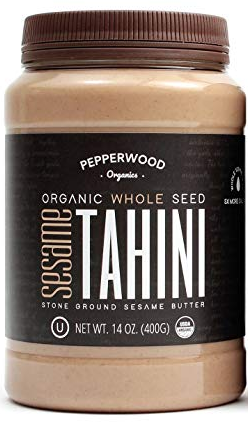
Pepperwood Organic Whole Seed Tahini is a perennially popular tahini thanks to its extreme simplicity and purity.
It is sourced from 100% organically grown and certified sesame seeds grown in Ethiopia; aside from this, there are no other ingredients.
Like all natural tahini products, you’ll have to stir it regularly to prevent the oil from separating from the seed, but that’s a result of no additional binders or emulsifiers added.
With this level of purity and simplicity, Pepperwood Organic Whole Seed Tahini is hard to beat.
2. Artisana Organics Raw Tahini
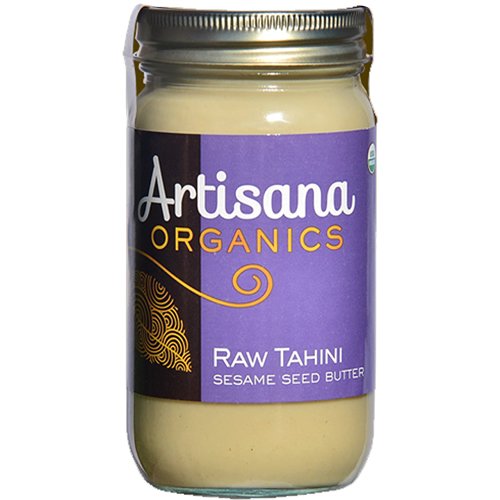
Artisana Organics Raw Tahini are made from totally raw and unroasted sesame seeds, and is produced in the United States.
This makes it a favorite among paleo, raw food, and whole 30 dieters, since it’s got all of the advantages of raw sesame seeds alongside the convenience of an easily spreadable condiment.
The organic certification only adds to its appeal, since it means you don’t have to worry about synthetic pesticides and fertilizers.
3. Trader Joe’s Organic Tahini
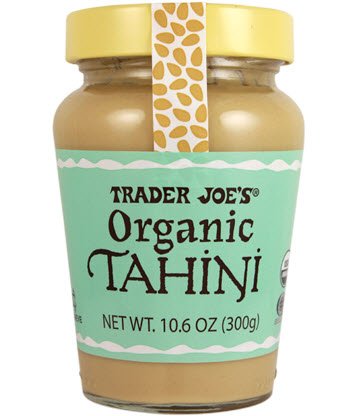
Trader Joe’s is a solid brand when it comes to simple and effective organic foods, and their tahini is no exception.
This 10.6 ounce jar is perfect for the occasional user, and the only ingredient is certified organic sesame seeds. For a simple, easy solution for a household of one or two, look no further than Trader Joe’s Organic Tahini.
4. Kevala Organic Sesame Tahini
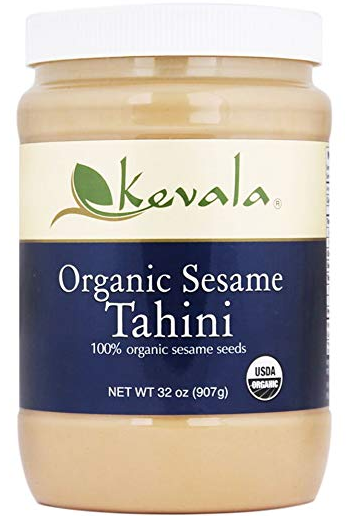
Kevala Organic Sesame Tahini comes in a large 32 ounce jar, and is made from organically grown sesame seeds, so you don’t have to worry about any contamination from pesticides and fertilizers.
The large plastic jar is BPA-free, and its large size makes Kevala a great choice for entertaining a large number of guests or feeding a big family with tahini-based foods.
5. Tahim Premium
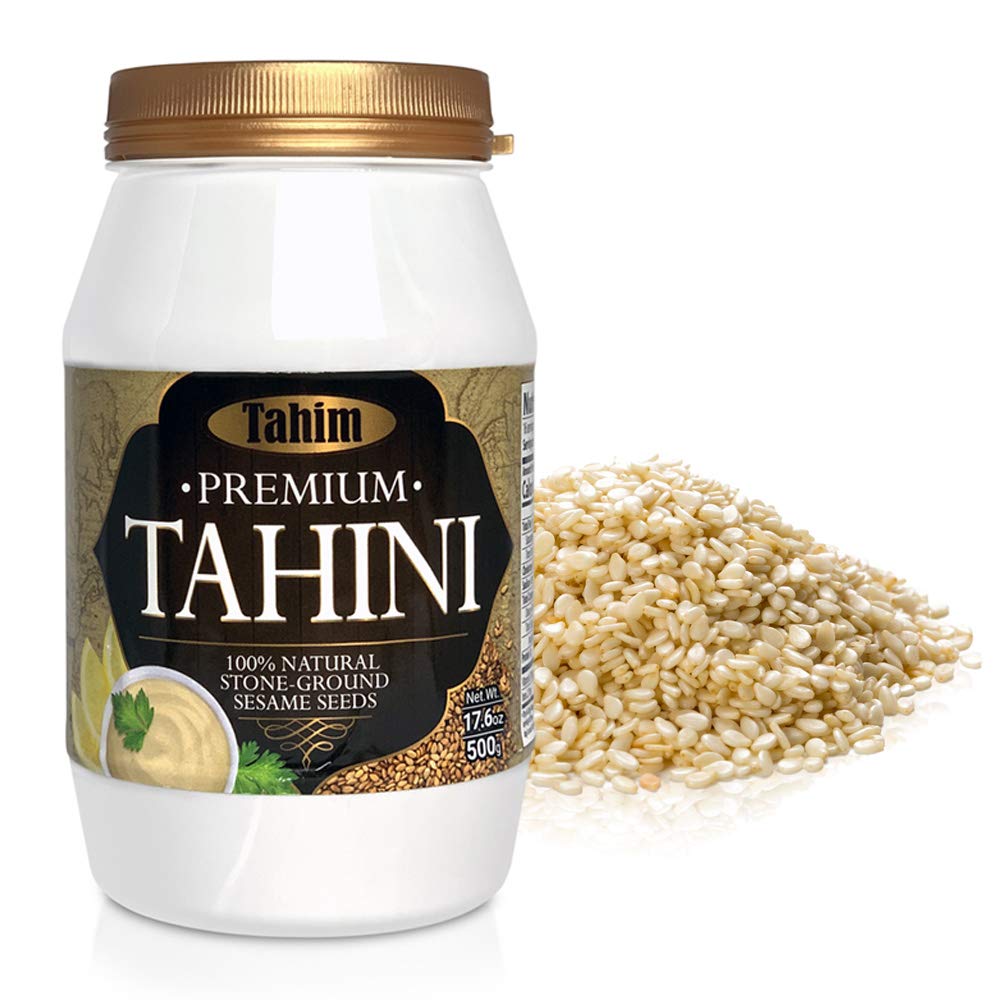
Tahim Premium uses traditional stone-ground processing for this Middle Eastern style tahini paste. While it’s not certified organic, its use of traditional processing makes it a great pick for Middle Eastern recipes.
6. Soom Sesame Premium Tahini
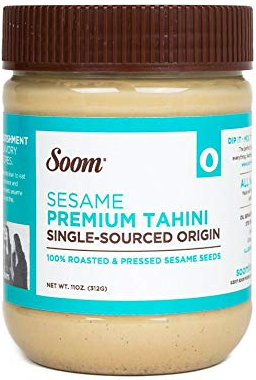
Soom Sesame Premium Tahini is a high-quality tahini made from Ethiopian-grown sesame seeds that comes in an 11 ounce plastic tub.
While it isn’t organically-certified, the single source sesame seed ingredients will appeal to purists, making it a solid pick for a premium tahini.
7. Haddar by Baracke Tahini
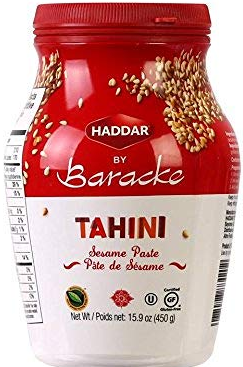
Haddar by Baracke Tahini is a pretty simple and basic tahini. It doesn’t have some of the perks of other brands, like single-source sesame seeds or an organic certification, but one thing that users do like about it is the fact that it’s much thicker than other tahini brands.
This makes Haddar by Baracke Tahini easier to use on its own as a spread, though more difficult to mix in to other recipes with additional ingredients.
8. Lebanon Valley Tahineh Extra
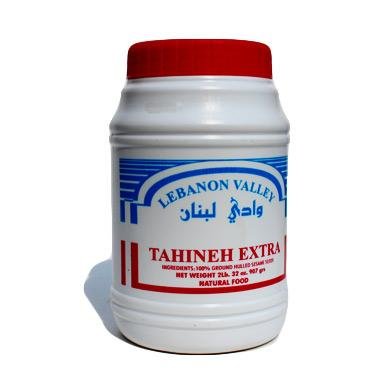
Lebanon Valley Tahineh Extra is grown and produced in Lebanon, where the regional preference is for a richer, stronger tahini flavor with a slight bitterness to it.
This deeper flavor profile isn’t for everybody, but those who enjoy it strongly endorse this tahini product.
9. Pepperwood Organic Tahini Bulk
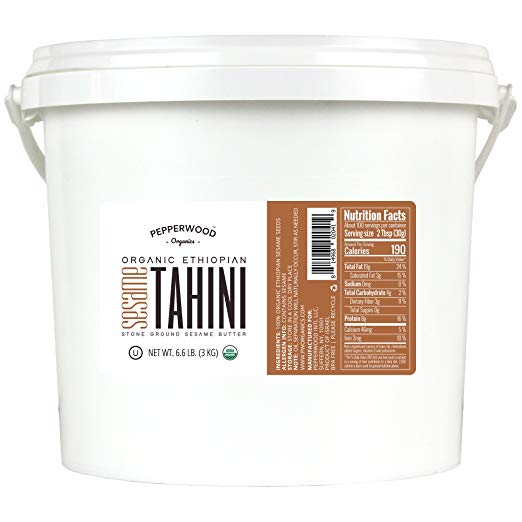
Pepperwood Organic Tahini also makes a special bulk-sized tahini that comes in an enormous 6.6 pound bucket.
While several companies offer bulk sized tahini, Pepperwood Organic’s is by far the best thanks to its single sourced sesame seeds and the organic certification.
If you’re cooking a huge meal for a big potluck or family get-together, look no further than this bulk tahini mix. Most users, however, would be better served by a smaller size, since it would take most people quite a while to get through this bulk-sized tahini.
Considering the lack of preservatives, and the fact that antioxidants and unsaturated fats don’t stay good forever, it’s probably better to opt for something in a smaller size.
10. Mighty Sesame Co Fine Sesame Tahini
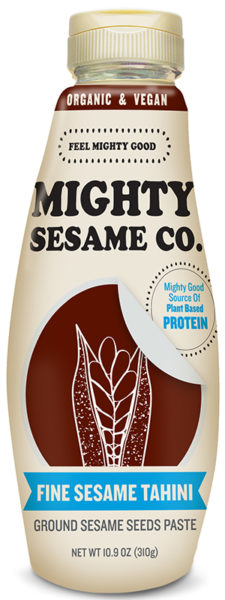
The main advantage of Mighty Sesame Co Fine Sesame Tahini is that it comes in a squeezable bottle, making it simple to drizzle tahini onto flat bread, sandwiches, and other dishes.
Amazingly, it doesn’t require any additional binders or stabilizers, though it’s not always easy to squeeze the bottle. You need to shake up the bottle a good bit to mix up the oil, so this hurts its convenience a bit.
Category winners
Best tahini overall: Pepperwood Organic Whole Seed Tahini
On balance, if you care about quality, taste, texture, and health, Pepperwood Organic Whole Seed Tahini is the best option out there for tahini. It’s certified organic, stone-ground, and carefully sourced, which all contribute to its top overall position in our rankings.
Best tahini for heart health: Kevala Organic Sesame Tahini
Making the most of tahini’s high unsaturated fat and omega 3 content means consuming a solid amount on a regular basis, and for this, you’ll be going through a lot of tahini. Kevala’s 32 ounce jars are perfect for this reason, and alongside their simple and pure formulation, this makes Kevala our recommendation for heart health.
Best raw tahini: Artisana Organics Raw Tahini
For raw food enthusiasts and Whole30 dieters, Artisana Organics makes an excellent tahini that not only advertises itself as raw, but is actually certified raw. If simple and unprocessed foods are a priority for you, Artisana is the way to go.
Best organic tahini: Pepperwood Organic Whole Seed Tahini
Since overall quality and sourcing was a major factor in our rankings, it should be no surprise that the best organic tahini is also our top overall tahini. Pepperwood does an excellent job with purity, simplicity, and keeping processing to a minimum.
Best bulk tahini: Kevala Organic Sesame Tahini
Making large batches of traditional Middle Eastern foods? The 32 ounce bulk size of Kevala Organic Sesame Tahini is hard to beat. Plus, thanks to the organic certification, you know your tahini is being sourced from high-quality plants.
Best tahini for tahini sauce: Trader Joe’s Organic Tahini
For occasional users, or people looking to use tahini in tahini sauce and other recipes, Trader Joe’s Organic Tahini is perfect. It’s small, simple, and economical, making it perfect for stocking your kitchen.
Who Should Buy Tahini?
Tahini is safe for most adults and can provide a nutrient-dense snack to help improve general health markers. It is also packed with antioxidants to help fight systemic inflammation and fight off disease.
Tahini can also benefit the brain due to its amount of omega-3 fatty acids.
Pregnant women should avoid tahini since it can be contaminated with salmonella.
How We Ranked
Tahini can come in a few different consistencies and flavors, depending on the preferred method of consumption. We included bulk products like Pepperwood Organic because it was cost-effective, organic, and great for large families or parties. But since tahini tends to spoil quickly, it was ranked near the bottom. Mighty Sesame Co Fine Sesame Tahini was a popular product that came in an easy to use a squeeze bottle but ended up on the bottom of our list because of its lack of purity and organic certification.
Okka Organic Creamy Tahini has a lighter consistency, due to being sourced out a company in Turkey. This made it better for dressings and recipes, which is why it found its way to the middle of the pack. Lebanon Valley Tahineh ranked well on our list despite its lack of organic certification because it provided a richer and stronger flavor of tahini without the bitterness. Traders Joe’s organic tahini made the top 3 for including a pure and clean product, free of any fillers and preservatives.
Artisana Organics Raw Tahini found its way into second place for being one of the only organic certified raw tahinis on our list. It’s easily spreadable and appeals to the paleo community since its completely natural and untreated. Our number 1 pick, Pepperwood Organic Whole Seed Tahini, has just one ingredient: 100% organically grown and certified sesame seeds grown in Ethiopia. There are no binders or emulsifiers added in this product, adding to the purity level.
Benefits
Tahini is rich in antioxidants. Initial research conducted in 1985 by a team of agricultural biochemists in Japan discovered that tahini contains, among other antioxidants, a unique compound they dubbed sesamolinol, as it had not been discovered in any plant seed other than the sesame seed (1).
Later research published in 2006 in the journal Food Chemistry characterized the antioxidant potential of the sesame seed hull in greater detail, and compared the antioxidant potential of white and black sesame seeds, which create slightly different taste profiles in tahini (2).
The researcher found that black sesame seeds, as you might expect, contained more potent antioxidant abilities, though not to an extreme extent—white sesame seeds, which make a milder, sweeter, and less bitter tahini, still exerts a strong antioxidant effect.
The bottom line from this research is if you want the maximum possible antioxidant content, get a tahini that’s made from black sesame seeds.
It will have a bolder and more bitter taste, so if you prefer something milder and sweeter, a white sesame seed tahini will still have solid antioxidant abilities, and a smoother taste.
Tahini supplies unsaturated fats which can help decrease your risk of heart disease. The caloric profile of sesame seeds, from which tahini is derived, is pretty solid from a heart health perspective.
Most of the calories in tahini come from fat, but the lion’s share is in the form of unsaturated fat. According to research published in the American Journal of Medicine, consuming a greater proportion of your calories from polyunsaturated and monounsaturated fats, such as those in tahini, is associated with beneficial changes in your cholesterol profile (3).
Specifically, unsaturated fats have the effect of decreasing LDL (“bad”) cholesterol, while leaving HDL cholesterol, also known as “good cholesterol,” unchanged.
The net effect is an improvement in the ratio of HDL to LDL cholesterol, which has a marked effect on your risk for cardiovascular disease. Further research from a randomized controlled trial published in 2005 in the Journal of the American Medical Association found that consuming unsaturated fats can help decrease blood pressure as well (4).
According to the results of that study, substituting carbohydrates in your diet with unsaturated fats, such as those found in tahini, will result in decreases in blood pressure, in addition to the improvements in cholesterol profiles that was demonstrated in earlier research.
This study also computed an ensemble estimate of cardiovascular disease risk, and found that the probability of suffering heart disease over the next ten years was lower when carbohydrates were substituted with unsaturated fats among the people in the study.
Tahini is rich in omega-3 fatty acids. If you don’t regularly eat fish, it can be hard to get enough omega-3 fatty acids in your diet.
While there are some supplements you can take that supply vegan omega 3 fatty acids, tahini is one additional source that provide a good amount of both EPA and DHA thanks to the high content of unsaturated fats in sesame seeds.
Raw tahini, in which the sesame seeds are not roasted, is an especially good source of omega 3 fatty acids, because none of the omega 3 fatty acids are oxidized by exposure to heat.
According to guidelines published in the Medical Journal of Australia, omega-3 fatty acid intake is typically very low in vegetarians and vegans (5).
This could pose a threat to maintaining optimal health if you are on one of these diets, as both EPA and DHA (two key compounds found in fish oil and other concentrated sources of omega-3 fatty acids) are essential for maintaining good overall health.
EPA and DHA have been associated with better overall health, both physical and mental. A 2003 study published in the American Journal of Clinical Nutrition that looked at DHA and EPA intake and incidence of fatal heart disease in a large cohort study (6).
The researchers measured blood levels of EPA and DHA directly, so there was no uncertainty regarding the actual intake of these nutrients in the subjects.
The researchers found that higher EPA and DHA intake was associated with a decreased risk for fatal heart disease, which they ascribed to the ability of DHA and EPA to prevent problems with heart arrhythmia.
The omega 3 fatty acids in tahini might be able to reduce symptoms of depression. Heart health is not the only area where greater omega-3 fatty acid intake is helpful.
Other research suggests that these nutrients, which are plentiful in tahini and rare in other vegetarian and vegan foods, can help contribute to better mental health too.
There has been a copious amount of research done on the effects of omega-3 fatty acids on treating depression, which was reviewed in a 2013 meta-analysis of 15 different randomized controlled trials (7).
After pooling the results, the researchers concluded that doses of EPA between about 200 and 2000 mg per day, were effective at reducing the severity of symptoms of depression.
In combination with other interventions, the evidence indicates that a diet rich in foods that supply omega-3 fatty acids is an effective way to reduce symptoms of depression.
Side effects
As a natural food prepared only from sesame seeds, there are essentially no side effects to tahini, discounting the rare chance of a sesame allergy.
The saturated fat content is low, and in the top-quality tahini products, there is no added sodium, so even people on restricted diets aimed at lowering saturated fat and sodium intake can have tahini without causing any problems.
FAQ
What is tahini made of? Tahini comes directly from the production of sesame seeds. The process of making tahini involves grinding sesame seeds and forming a paste or a dip. If you’re allergic to sesame seeds, you should completely avoid tahini, since it’s the primary ingredient in the product.
Is tahini vegan and gluten-free? Yes, most tahini is gluten-free and vegan-friendly. However, there may be additives that aren’t, so it’s essential to check the nutrition label beforehand.
Is tahini bad for you? Other than the risk of developing salmonella or having an allergic reaction, the side effects of consuming tahini are relatively minimal. In a study published in 2006, scientists overviewed the case of an individual suffering from a severe allergic reaction as a result of consuming tahini. The study essentially determined that the allergic reaction was a result of the patient’s allergy to sesame seeds, which are a major ingredient in tahini (8).
Because tahini paste is made of sesame seeds, there also seems to be an increased risk of salmonella poisoning. In a 2004 study, scientists assessed sesame seed-based products to determine the rates of salmonella in these products. Approximately 9% of these products had salmonella, including tahini (9).
Does tahini cause inflammation? Tahini does not cause inflammation unless you are allergic to it. In fact, tahini has the ability to reduce overall systemic inflammation in the body since due to its high antioxidant levels. If you currently have a health condition that involves inflammation, adding tahini to your diet may prove beneficial to helping to treat the symptoms.
Is tahini considered a superfood? A superfood is a marketing term that tends to include nutrient-rich foods that may potentially yield incredible health benefits, whether that means. Though tahini is not yet officially considered a superfood, it includes many of the characteristics of the typical superfood such as high levels of vitamins and minerals like iron, magnesium, B6, and phosphorous. Tahini is also considered a useful tool in helping to fight the development of many types of diseases.
Should I refrigerate tahini? If you’re storing your tahini in a cool, dry place like in a pantry, there should be no concern about the product going bad or expiring sooner than usual. However, if you live in a hot or humid environment, you might want to refrigerate your tahini to protect it from the environment.
How long does tahini stay fresh? For the most part, tahini shouldn’t go bad for up to six months. If you store your tahini in the refrigerator, it could last an additional six months, though this depends on the product, your environment, and how you’re storing it.
Is tahini good for weight loss? If you’re consuming tahini in large amounts, the 8 grams of fat per serving can cause weight gain. Though these are considered healthy fats, there is still a daily limit for how much fat you can consume. On the contrary, one serving of tahini also has relatively decent levels of fiber, which can improve your digestive system and increase satiety. All in all, tahini is unlikely to cause weight loss unless combined with a proper diet and exercise program.
Can you eat tahini straight? While you can certainly eat tahini by itself in the same way you can eat peanut butter by the spoonful, most people prefer to add it to some type of food. One of the most popular ways of eating tahini is as a dip for vegetables in the same way people may use hummus or ranch dressing. If you would rather use your tahini as a condiment for foods, you can find it in a thinner consistency that can be used on top of salads or other major dishes.
What is tahini? Tahini is a food spread that comes from processing ground sesame seeds. The sesame plant is native to Africa and India, though other countries have begun cultivating the plant.
Is tahini the same as tahina? Yes, tahini and tahina are the same product.
Is tahini healthy? Most benefits of tahini are related to its nutritional content and the role these nutrients play in normal body functioning. Tahini is known for containing antioxidants that boast incredible benefits like anti-inflammatory effects, even possibly reducing the risk of serious disease development, like Alzheimer’s and Parkinson’s. With that said, most of the benefits associated with tahini are a result of the high nutritional value, ability to affect weight, and control blood sugar (10).
Where can I buy tahini? For the most part, you can find tahini products at most grocery stores and major retail chains like Walmart. Online retailers like Amazon will probably have more options of tahini. You can also make your own tahini by merely buying the ingredients from a supermarket or your local farmers’ market.
Can tahini fight free radicals? Yes, tahini can fight free radicals because it’s rich in antioxidants. Specifically, tahini made from black sesame seeds is the highest in antioxidants. A 2006 study showed that black sesame seeds contained more potent antioxidant abilities, compared to white sesame seeds, but provided a more bitter-tasting tahini spread (11).
Why is tahini so expensive? The primary reason that tahini is expensive is that it’s an all-natural product that doesn’t use any artificial ingredients. Many have realized that making the tahini yourself can be much cheaper than buying it in a store.
How do you make tahini? Tahini is an ancient food made by grinding and sometimes roasting sesame seeds, which results in a smooth, creamy spread that’s rich in flavor as well as beneficial antioxidants and unsaturated fats. It’s prized both for its flavor and for its protein and omega 3 fatty acid content. Further, since many of the best tahini products are made directly from raw sesame seeds, it’s compatible with a wide variety of diets, including the paleo diet and the whole 30 diet.
Will tahini spoil? Like almost every other food, tahini will eventually go bad. Tahini will spoil quicker if it’s stored in a humid, warm environment. The lifespan will also depend on the type of tahini you have. There is a significant difference between the lifespan of homemade tahini and store-bought tahini. Your best bet for prolonging how long your tahini lasts is storing it properly.
Does tahini benefit the brain? Yes, tahini can provide benefits to the brain since it’s rich in omega-3 fatty acids. Raw tahini is an especially good source of omega-3 fatty acids since it is unaltered. Omega-3 fatty acids contain EPA and DHA, both essential for maintaining good health. A 2003 study showed that EPA and DHA decreased the risk of fatal heart disease by preventing heart arrhythmia issues (12).
Does tahini help combat heart disease? The main type of fat found in tahini is unsaturated, which can help decrease the likelihood of developing heart disease. This is because unsaturated fats help to decrease bad LDL cholesterol. As a result, the ratio of good to bad cholesterol improves, which we know from studies indicates a lowered risk of CVD.
Can you eat tahini if you’re pregnant? There are concerns about consuming tahini while pregnant due to a large number of instances of salmonella contamination found in sesame seeds. The effects of salmonella can be much more severe if you’re pregnant since the illness can affect the placenta and fetus.
What does tahini taste like? Generally speaking, many report that tahini has a nutty taste, but also seems to be a bit bitter. In terms of texture and consistency, it’s similar to most nut butter, particularly peanut butter.
How do I make tahini? Tahini is extremely easy to make and is more cost-effective than buying tahini. Making tahini requires a large number of sesame seeds and a small amount of olive oil. First, place the sesame seeds on a baking sheet and cook them at about 350 degrees for around 10 minutes. Next, using some type of food processor, grind the sesame seeds into a fine powder. Then add the olive oil to the blended sesame seeds.
Why is tahini bitter? The primary reason tahini is bitter is because it comes directly from sesame seeds. The most common ways to make tahini less bitter include adding lemon juice or adding salt.
Can tahini improve depression? Yes, research has shown that the brain-boosting nutrients, DHA and EPA, found in tahini can help reduce symptoms of depression. A 2013 meta-analysis of 15 different randomized controlled trials showed that omega-3 fatty acids are effective at reducing depression symptoms (13).
Can tahini improve your cholesterol profile? Yes, tahini can improve your cholesterol profile by reducing bad cholesterol. This is because tahini is packed polyunsaturated and monounsaturated fats, which have been shown to improve cholesterol profiles in humans.
Can tahini help improve blood sugar? Due to the high content of omega-3 fatty acids, which can stimulate the production of glucose, tahini can help increase blood sugar levels. However, it’s important to note that a significant amount of tahini would need to be consumed before it starts to influence blood sugar levels in a healthy adult.
Can tahini lower blood pressure? Chronic high blood pressure can lead to severe issues like strokes, heart attacks, kidney failure, and even death. Tahini itself shouldn’t affect blood preussure, but the nutrients inside may be able to influence blood pressure. A 2015 study found that persons taking three grams of omega-3 fatty acids per day decreased blood pressure levels. Another 1993 meta-analysis confirmed the same thing (14).
Can tahini cause IBS like symptoms? A common side effect of too much omega-3 fatty acids at once is gut issues. Since tahini is rich in omega-3 fatty acids, it may stimulate IBS like symptoms in certain individuals. Furthermore, tahini is high in fiber, which may further irritate the gut – especially in persons that are sensitive.
Related Articles
Recap
Tahini is a food that’s made from crushed sesame seeds, and is very rich in unsaturated fat, antioxidants, and omega-3 fatty acids.
It has robust benefits for heart health, and could also be a useful addition to your diet to reduce symptoms of depression, too.
The antioxidant effects are most potent for tahini made from black sesame seeds, but even white sesame seeds contain strong antioxidant abilities.
Given how versatile tahini is as a food, and how compatible it is with even the most restrictive dietary plans, it’s a great way to improve the overall quality of your diet.
For BodyNutrition’s #1 tahini recommendation, click here.